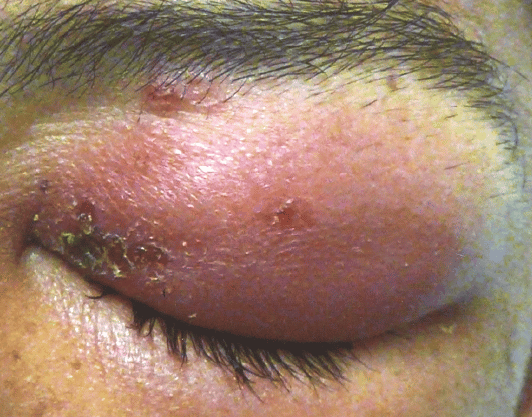Eye or ocular herpes is a viral infection of the eyes that can cause pain, inflammation, and discharge. It is most commonly caused by the herpes simplex virus (HSV), but other viruses may also trigger this eye infection.
The American Academy of Ophthalmology estimates the diagnosis of approximately 24,000 new cases of eye herpes every year in the United States.
Types of Eye Herpes (Ocular Herpes)
The most common type of eye herpes is epithelial keratitis. In this type, the virus is present in the cornea’s thin outermost layer, epithelium.
Herpes virus can also harm the stroma, one of the cornea’s deeper layers. This specific ocular herpes infection is called stromal keratitis.
In comparison, stromal keratitis is more dangerous than epithelial keratitis because it can damage your cornea to the point of blindness and can recur anytime.
Eye Herpes Symptoms
Eye herpes has several symptoms, including redness and a burning sensation in the eye. You may also notice a discharge from your eyes. Apart from that, a person infected with eye herpes may feel a shooting or stabbing pain in one or both eyes. This pain may come and spread down your face, neck or back. Your cornea and conjunctiva (the front part of the eye) are likely to be infected and can cause vision loss in severe cases.
Other symptoms of eye herpes also include:
- Light sensitivity
- Inflamed eyelids
- Frequent tearing
- Red blisters on the upper eyelid
These herpes symptoms typically appear within two to four days after exposure to the virus and may last several days. Proper treatment, however, may reduce the time for recovery.
Eye herpes may be confused with conjunctivitis, more commonly referred to as pink eye. Both infections could be brought on by a virus. However, unlike eye herpes, conjunctivitis can also be caused by other factors such as allergies, bacteria, or chemicals.
Effective Ways To Avoid Eye Herpes
To keep eye herpes from recurring, you should maintain good personal hygiene. Clean your eyes regularly and wear gloves when handling eye drops to prevent infection. To keep eye herpes at bay, you should limit your exposure to ultraviolet (UV) rays. Wear glasses when you’re outside for protection. As much as possible, avoid rubbing your eyes. It can cause the spread of the virus or irritate your eyes further. Lastly, wash your eyes with clean water frequently.
Though they might last longer, herpes simplex ocular herpes typically heals in 1 to 2 weeks. Herpes drugs treatment is required to lower the risk of problems.

